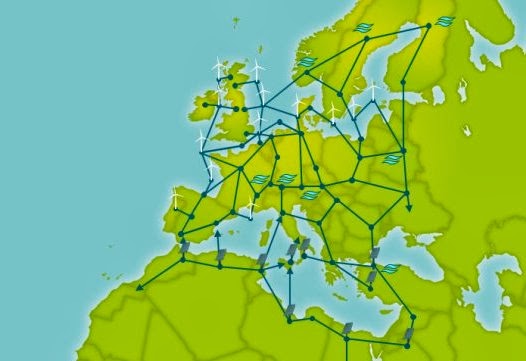Supply Security as Renewable Energy Grows: European Disagreements
-- a _kt75 | reprint
 European Union governments and the bloc’s executive arm are splitting over how to guarantee electricity supply as the region builds more renewable power.
European Union governments and the bloc’s executive arm are splitting over how to guarantee electricity supply as the region builds more renewable power.
Germany, France and the U.K. are following nations from Spain to Greece in developing programs called capacity mechanisms to pay utilities to keep plants on standby from as early as 2016. The European Commission instead plans a single market by the end of the year. Supply and demand in 15 markets was for the first time linked today through a daily auction.
Europe’s power market relied on intermittent wind and solar output for a record 7.4 percent of generation in 2012, a share poised to reach 18 percent by 2020, according to Energy Brainpool GmbH & Co. KG., a Berlin-based consultant. The renewable energy boom cut profitable hours at coal and gas-fired plants and IHS Inc. estimates that as much as 60 percent of the region’s gas capacity isn’t covering costs and may be at risk of closure by 2016.
“Capacity mechanisms are popping up like mushrooms all over Europe,” David Viduna, head of long-term origination at Prague-based utility CEZ AS, said in an interview in Vienna on Jan. 29. “The point is that all those efforts need to be harmonized” because payments in one country affect the competitiveness of plants in neighboring countries, he said.
Nations are seeking to prevent blackouts as utilities plan the biggest-ever wave of shutdowns of unprofitable power plants. As much as 110 gigawatts of gas-fired capacity probably will shut in the next three years, according to IHS, a researcher based in Englewood, Colorado. One gigawatt is enough to power about 2 million European homes.
U.K. utilities from Centrica Plc to SSE Plc will be able to bid in an auction this year to offer backup power plants from 2018 at the lowest possible cost, according to the Department for Energy and Climate Change.
“We need more generation,” Michael Fallon, U.K.’s energy minister, said Jan. 21 in an interview. “We’re losing a fifth of our capacity over the next 10 years.”
Even with 58 nuclear reactors designed to operate 24 hours a day, France doesn’t have enough capacity to meet peak winter demand. Europe’s second-biggest power user may have to import almost 3,600 megawatts during cold snaps this winter, according to RTE, Electricite de France SA’s grid unit. There’s a “moderate risk of supply shortages,” the network manager said in a Nov. 7 report.
“France is convinced of the need” to take action to prevent blackouts, Robert Durdilly, president of the Union Francaise de l’Electricite, which represents power producers and distributors, said Jan. 29 in an interview.
From 2016, suppliers without enough capacity to meet the highest peak in demand from their customers must purchase certificates from generators guaranteeing backup supply, according to Commission de Regulation de l’Energie, the Paris- based regulator.
Germany, Europe’s biggest market, is paying plants deemed essential for power supply stability, including EON SE’s Irsching gas-fired plant in Bavaria, on an individual basis. Details have not yet been agreed to for a longer-term measure, according to a text adopted at a meeting of Chancellor Angela Merkel’s cabinet in Meseberg that ended Jan. 23. Read on...

